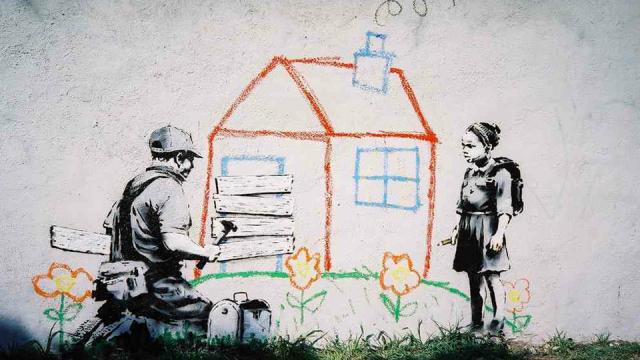
Artist Credit: Banksy. Crayon House Foreclosure, East Los Angeles
When inequality and social injustice reach the extreme forms we increasingly see today, we need new language to describe it. Yes, we have growing inequality, racism and social exclusion. But we also have something else that represents the current stage of global capitalism: expulsions.
From 2005 to 2010, some 9.3 million mortgage foreclosure notices were sent to households in the U.S., amounting to about 35 million people losing their homes.
During these same years, 70 million hectares of land were bought by foreign governments and global firms in less developed countries. A picture of expulsions in the Global North and in the Global South begins to take shape. For example, when China buys 2.8 million hectares of land in Zambia to grow palm for bio-fuels, it evicts whole villages and smallholder agriculture systems, not to mention entire ecosystems of flora and fauna. And when JPMorgan Chase purchases 40,000 hectares of land in Ukraine, it does to Ukrainians what it and other banks did to Americans: it forecloses on them.
The story here at home hasn’t even played out yet, as we can expect the brutal expulsion of middle-class homeowners to get much worse. By the time many housing contracts reach maturity in 2014, foreclosures in the U.S. could reach 14 million—which is another way of saying that the worst years have just begun. The numbers of people involved—often between two and four, and often more, per household—is far larger than the number of physical homes.
It must be recognized that foreclosed homes don’t always mean evicted households; some homes have gone through several foreclosures, so the number of evictions isn’t the same as the number of foreclosures. That said, we know that more than three-quarters of the foreclosures between 2005 and 2010—over 7.2 million—have resulted in families being evicted from their homes, meaning possibly 20 million people or more (couples, grandparents, children) losing their roofs.
Not all wind up on the street. Many move to smaller rental units or single room occupancies, or temporarily double up with family and friends. But many are now in tent cities, or so-called slab-cities in the desert, and in homeless shelters. Some of these foreclosures happened on houses and buildings that contain renters; these tend to be low-income people with few options who are at high risk of losing what little they had or were on their way to achieving.
Here is a brief summary of the numbers of foreclosures between 2006 and 2010 (note: a house may go through more than one foreclosure, and each foreclosure does not represent an eviction):
• 2006: 1.2 million foreclosures, up 42% from 2005 (equivalent to 1 in every 92 U.S. households)
• 2007: 2.2 million foreclosures, up 75% from 2006
• 2008: 3.1 million foreclosures, up 81% from 2007
• 2009: 3.9 million foreclosures (equivalent to 1 in 45 U.S. households, a 120% increase between 2007-9)
• 2010: 2.9 million foreclosures
(Source: RealtyTrac 2007, 2008, 2009, 2010; Blomquist 2011)
The common understanding presented to the public is that these foreclosures were the result of irresponsible homeowners. This is incorrect. At the center of this short and brutal history is the highly paid, much admired financial engineering that began in the 1980s and reached new heights in the 2000s, when bank profits were no longer based on the value of the mortgages or actual assets.
Instead, high-finance instruments made it possible for banks and lenders to simply get housing contracts signed, then bundle those contracts together with debt of all kinds that were then sold to financial institutions. Soaring profits were made at various stages in this process, and firms that hung onto the actual mortgages suffered losses. But in the end, they got a bailout. And the people who lost their homes, their savings, their futures, did not.
The brutality of eviction, of losing the little material security one has, did not factor into the calculations of our financially creative class, who many now consider a criminal corporate elite. The fact that neighborhoods and communities would be destroyed, shops shuttered and businesses folded, municipal governments and social programs slashed and literally trillions of dollars wiped from the national books did not—and does not—factor in.
What’s alarming is that we may have only just seen the beginning of this housing catastrophe. Tens of millions more could soon be without shelter if our banks—the very institutions we the taxpayers spent hundreds of billions to bail out—continue the process of foreclosing on America. The question is whether Americans, from federal to local government, will decide that the banks and financial institutions must be the ones who face foreclosure instead.
3 WAYS TO SHOW YOUR SUPPORT
- Log in to post comments













